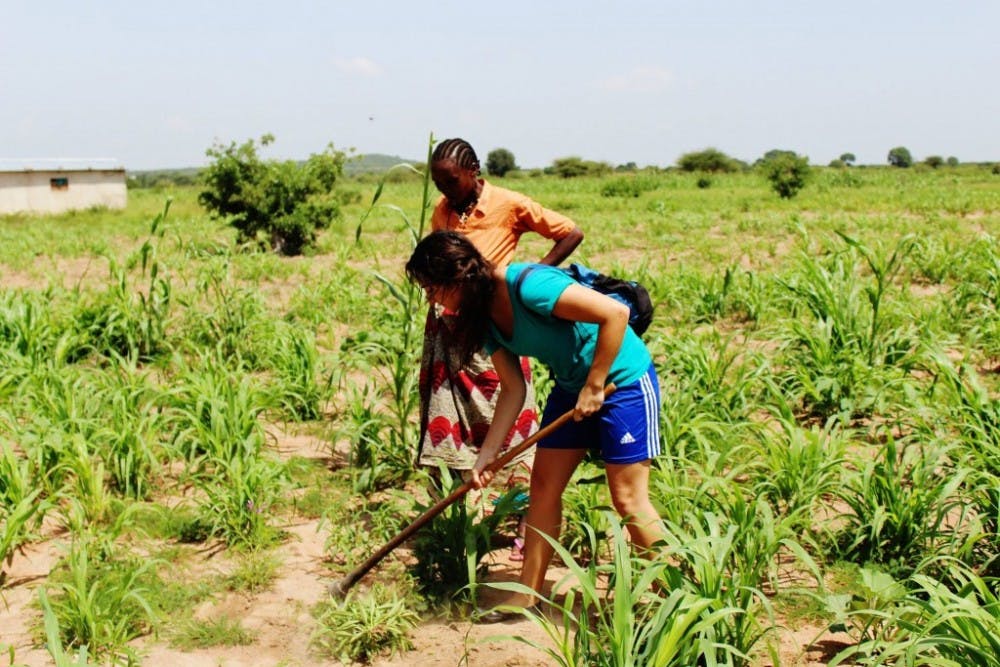Junior Laura Conroy returned home from a busy schedule filled with classes, homework and sorority activities and glanced down at the small calendar she bought while studying abroad in Ghana. As the memories of delivering soccer balls and helping out local Ghanaian communities returned to her mind, she realized she got more out of the trip than the Ghanaians who had received her help.
“We provided [the Ghanaians] with material goods, but I think they provided us with a lot more because I walked away still with their faces in my mind,” Conroy said. “I’m not sure if they think about us, but I definitely still think about them.”
Although Conroy said she benefited from the experience of giving back to the local community she had visited, some like Heidi Frontani, professor of geography, think offering aid does more harm than good.
“[By giving handouts], you create dependent communities that are just sitting there waiting for the next group of people to come through and give them things,” Frontani said. “That’s not what people want. Nobody wants that anywhere in the world.”
In order to ensure students have productive experiences while studying abroad, Elon offers several opportunities for students to practice global citizenship through service. As founding director of Project Pericles, a program designed to provide students with a sense of social responsibility and civic concern, Thomas Arcaro has led several service trips to Africa.
According to Arcaro, providing meaningful aid is not as easy as people think.
“Service isn’t easy if it’s done right,” Arcaro said. “If it’s done in a partnering, not patronizing, way, it’s really a lot of work. It’s rewarding as hell, but it’s a lot of work.”
The key to providing effective aid through service is to spend money wisely, he added.
“There’s a huge cost of going [to Africa],” Arcaro said. “That cost has to be more than offset by the value added of what we would do in country ‘X’ or ‘Y’ or whatever that country is.”
While some students choose to spend a semester abroad, others like Conroy go abroad during Winter Term, which can be a major expense.
The most recent cost, credit and prerequisites chart shows that the 2016 Winter Term study abroad costs range from $3,750 to $8,100.
People choosing to do service in Africa independently would pay more than $1,000 in airfare alone. With other costs of travel, such as food and shelter, a round trip experience to the continent could easily exceed $2,000.
In order to offset the cost of traveling to Africa with the value added of doing service in a country, Arcaro urges students to develop a deep understanding of the place they are visiting. He and Frontani also hope more people will eliminate some of the common misconceptions and stereotypes about Africa before they make travel arrangements. According to Frontani, most students don’t realize Africa is made up of 54 countries with both urban and rural regions.
Because of the short length of Winter Term trips compared to a semester abroad, Frontani said students need to return to the places they visit.
“We have so many students going on J-Term,” Frontani said. “I think J-Term’s a great thing to do, but I would love to see a lot more follow up where a student would maybe do J-Term in Ghana, spend the time with the group, get acclimated a little bit and then already have planned at that point to stay on for the spring.”
Though Conroy said she got more out of her experience than the people she helped, she believes it’s important to visit the places you’re trying to help rather than sending money.
“When you get to hand a child their first soccer ball or their first real notebook, it’s a moment you’ll never forget because you realize that you’re actually touching a human life, not just a piece of paper that you sign a check to,” Conroy said. “I think it’s really important for people to see who they’re donating to and what kind of cause you’re helping.”


